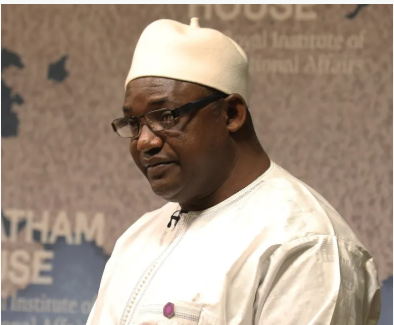Objectives of the Securiport Contract
In March 2023, President Adama Barrow of The Gambia addressed the controversial Securiport contract, justifying its necessity and strategic benefits for the nation. The primary objective of the Securiport contract is to enhance the country’s border security infrastructure through advanced technological solutions. By implementing automated systems at major points of entry, such as Banjul International Airport, the government aims to align with international standards in border control, improve efficiency, and reduce human error. These systems, which include biometric identification, electronic passport readers, and automated clearance lanes, are designed to expedite passenger processing times and minimize human interactions, which can be prone to corruption or inefficiencies.

Barrow argued that the Securiport system would not only boost national security but also elevate the country’s profile on the international stage by demonstrating a commitment to modernizing its border control processes. This initiative aligns with the government’s broader strategy of enhancing transparency, streamlining processes, and improving the quality of governance.
Financial Justifications
The financial justification for the Securiport contract centers around its potential long-term economic benefits. Despite the initial investment being a point of contention, Barrow defended the contract by emphasizing its economic rationale. He argued that the efficiencies gained through the Securiport system would result in significant cost savings for the government, reduce administrative overhead, and enhance the overall ease of doing business in The Gambia. Barrow highlighted that the deal was negotiated with provisions that ensure favorable terms for The Gambia, with a focus on monitoring and evaluation to safeguard public interests.
Furthermore, the government projected that the automated system would stimulate increased tourism and trade. By reducing barriers to travel and improving the processing time for travelers, The Gambia could potentially attract more visitors and investors, which would bolster the country’s economy. Barrow stressed that these benefits far outweighed the initial investment, positioning the Securiport contract as a transformative step towards sustainable economic development.
Criticism and Addressing Public Concerns
Despite the financial and strategic justifications provided by President Barrow, the Securiport contract has been met with considerable criticism. Opponents have raised concerns over the transparency and fairness of the contract’s award process, accusing the government of engaging in opaque dealings and favoring foreign interests at the expense of local businesses. Some critics argued that the selection of Securiport, a foreign company, lacked proper scrutiny and failed to consider domestic alternatives.
Addressing these concerns, Barrow defended the procurement process as transparent and fair, stating that Securiport was selected following a competitive bidding process in accordance with international standards. He emphasized that the contract was awarded based on the company’s proven track record and its ability to deliver the required technology and services efficiently. To address public concerns about the contract’s financial implications, Barrow announced the establishment of a task force to oversee the implementation of the Securiport system. This task force is tasked with ensuring transparency and monitoring the rollout to avoid potential cost overruns and inefficiencies.
“We are committed to regular updates and reports on the progress of the Securiport project to demonstrate the value it brings to the Gambian people,” Barrow stated. “Our goal is to build public trust and ensure that the benefits of this contract are tangible and beneficial for our citizens.”
The Road Ahead
Looking ahead, the government’s focus will be on the phased implementation of the Securiport system. Barrow outlined a detailed strategy that includes regular consultations with stakeholders, including civil society, opposition parties, and the general public. This approach is intended to ensure a smooth transition and address any emerging issues promptly. The government’s commitment to transparency and public engagement is crucial for the successful implementation of the Securiport system. Barrow acknowledged the importance of maintaining public support throughout the process, recognizing that public buy-in is vital for the project’s long-term success.
The task force established by Barrow will monitor the contract’s implementation closely, ensuring that it delivers on its promises without escalating costs. “We are committed to accountability,” Barrow said. “By providing regular updates and reports, we aim to demonstrate the value of this investment and address any concerns as they arise. This approach is not only about enhancing our borders but also about fostering a more open, transparent, and accountable government.”
Conclusion
President Barrow’s justification for the Securiport contract reflects his administration’s commitment to modernizing The Gambia’s infrastructure and improving its security framework. While the contract remains a divisive issue, Barrow’s approach to addressing public concerns, ensuring transparency, and implementing the system with effective oversight provides a blueprint for future governance. The success of the Securiport initiative will be a critical measure of Barrow’s ability to navigate the complex challenges of modernization and governance. As The Gambia moves forward, the outcomes of this contract will not only impact security but also shape the country’s economic trajectory, setting a precedent for other development projects.
In conclusion, the Securiport contract is a pivotal step towards a safer, more modern Gambia. The government’s efforts to address criticisms, engage stakeholders, and manage the implementation process will be crucial in transforming this initiative from a controversial contract into a symbol of progress and security for the nation.






